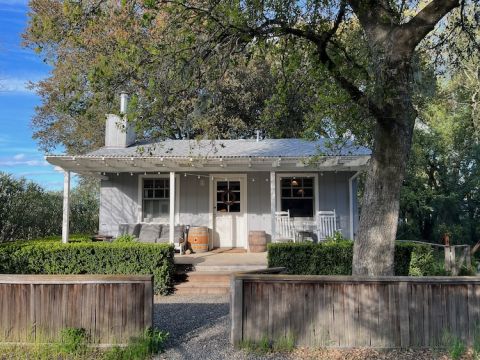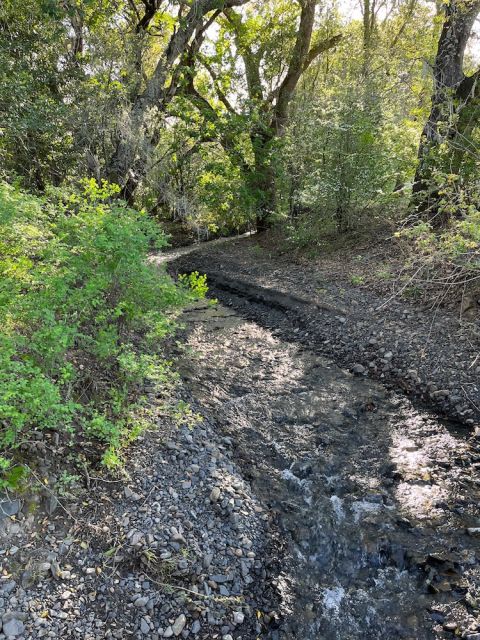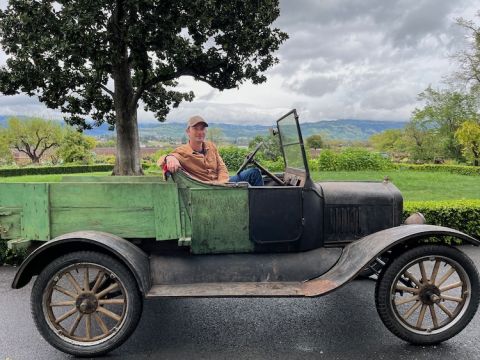On each of my last two visits to Napa Valley I’ve deliberately spent time with a family that represents the antithesis of that viticultural Eden’s glamorous image. At both MacDonald and Morisoli they prune the vines themselves. They drive (and mend) the tractor. And to balance the books they sell most of their fruit to prestigious names and make wine from only a minority of their grapes.
But Graeme and Alex MacDonald have already established such a following for their rich-but-fresh MacDonald Cabernet that their 1,600 regular customers buy every vintage, and they have 10,000 others on their waiting list.
The reason their wine is so good is not just because Graeme nurtures every vine himself, but because the vineyard is incredibly well-sited. It’s slap bang next to Mondavi’s famous To Kalon vineyard on Oakville benchland, whose grapes are the most expensive in the entire Napa Valley. To access the modest ranch house (above) next to the vines, where Graeme and his wife raised their young daughters, you have to cross a creek that Graeme, who has become one of Napa Valley’s best-informed historians, has managed to have registered as To Kalon Creek (see below). He could well argue that their land was actually part of the original, late-19th-century To Kalon vineyard. But Robert Mondavi Winery is now owned by the giant Constellation Brands, and the young brothers could hardly afford the litigation that use of the To Kalon name for wine has involved over the years, as it has become a fiercely contested trademark.
The MacDonald family grew vines almost by accident. In 1954 the brothers’ great-grandfather found his ideal retirement home in the valley, but the vendor insisted it came with its 30 acres (12 ha) of land. Robert Mondavi, California’s most famous vintner, was still at his old family firm Charles Krug at the time and advised the family to plant vines on it, originally half white-wine grapes and only half red. Once the vines were producing, it was natural to offer the grapes to Robert Mondavi. When in 1966 after a family argument he left Charles Krug to set up his eponymous winery, he offered $50 more a ton than his brother Peter Mondavi at Charles Krug, so the MacDonalds continued to supply the Robert Mondavi Winery with grapes, for its most expensive Cabernet bottlings, for more than 60 years until 2021 – all on the basis of a handshake. Long-standing Mondavi winemaker Genevieve Janssens, a huge admirer of the MacDonalds' particular slice of Oakville gravel, has become a mentor for the brothers.
Ownership of the MacDonald vineyard passed to the brothers’ mother and two aunts, who were not remotely impressed when in 2004 Graeme and Alex, who’d grown up in Marin County to the south, not in the valley, came up with the idea of making wine themselves – until they said they would pay full price for the grapes. On Mondavi’s advice, Graeme signed up for UC Davis’s oenology course while interning in a wide range of California wineries. Alex, the younger brother, is the only other employee looking after their 15 acres. They were able to launch their first commercial vintage, all of 92 cases initially, in 2010.
Nowadays they openly admit they cherry-pick the best third of each (organically farmed) crop for their own wine, not least the grapes from the remaining half-acre of the original 1954 plantings. Graeme makes the wines in space borrowed from his friend and fellow winemaker Alex Kongsgaard. The 2019 Cabernet that they opened for me had been released the previous September at $195 a bottle and was an immediate sell-out.
The MacDonald family emigrated from Scotland after the defeat of Bonnie Prince Charlie. ‘Dad would wear a kilt at Christmas’, I was told, but they are not at all keen on any association with Macdonald's burgers.
That heartwarming visit was last year. The Morisoli family I visited this year is not dissimilar, just a couple of miles up Highway 29 in Rutherford, also in prime viticultural land on the cooler west side, next to Francis Ford Coppola’s Victorian homestead. Unlike the MacDonalds, the Morisolis are just beginning on the path of winemaking for themselves and are currently bottling only a tiny fraction of the fruit they grow.
Until Christopher Morisoli returned to join his father Gary after 12 years in the US army, with stints in Iraq and Afghanistan, the lovingly tended Morisoli vineyard was fully dedicated to supplying Cabernet grapes for the likes of neighbour Beaulieu’s top Georges de Latour bottling. Their fruit has such a reputation that several producers who buy it – such as Amici, Elyse and V Sattui – cite Morisoli Vineyard on the label. (Morisoli-Borges is a separate operation run by Gary’s brother.)
Gary is a farmer through and through, and managed several high-profile vineyards in the early years of this century as well as his own. They have much more land than the MacDonalds, 57 acres (23 ha), of which 45 are planted with Napa Valley’s most valuable crop, Cabernet Sauvignon.
So father and son, who both work in the vineyards, can’t do it all themselves. ‘We have three full-time workers’, Christopher told me, ‘but we do all tractor work. My dad is brilliant at vineyards.’ In fact when fixing up this visit, I had to co-ordinate with their tractor schedule. Gary proudly described his various tractors, one dating from 1934. ‘They’re older than some of our vines. The old stuff can be fixed, unlike new ones.’
Gary wasn’t nearly as interested in the Morisoli wines, launched with the 2018 vintage made on the return of Christopher, who was keen to show me every vintage to date. It was clear during my tasting of all Morisoli bottlings to date – and many of the wines made from their grapes – that Gary was itching to get out in the vineyard and more or less professed all the wines tasted the same to him. They have their wines made at Beaulieu by Joel Aiken, who was winemaker there for 28 years, so he knew the Morisoli fruit intimately. ‘He’s quiet, which fits the vibe here’, observed Gary contentedly.
The oldest Morisoli Cabernet vines date from 1992. Thanks to red blotch virus, they have had to pull out some of them recently. It was clear when tasting the wines made by others from Morisoli fruit that some of their clients treasure how ripe they can get their grapes. Aiken’s versions were a bit more restrained, with the 2021 in particular showing the famous local terroir, a surprisingly pleasing earthy aroma known as ‘Rutherford dust’.
The Morisoli Cabernet is sold, like the MacDonald version and so many other Napa Cabs, via a mailing list which they are currently building. When deciding on its price, they felt they shouldn’t undercut those who buy their fruit. The highest price was Amici’s at $195, so their wine is $205 a bottle.
The Morisolis recently restored a Model T Ford (driven by Christopher above) in which Gary’s grandfather Plinio, born in the house where we tasted, did his deliveries from the Rutherford general store, which he managed alongside several important vineyards in the valley.
In a bottle of Morisoli wine, you really do have the history of the wine world’s most famous valley. Plus a bit of tractor oil, perhaps.
Napa DIY farmers
Family-owned properties where family members do the vineyard work. Several more names have been added since publication.
Aerika of Mount Veeder (new venture)
Buehler Vineyards of St Helena
Corison of St Helena
Favia of Coombsville
Frog’s Leap of Rutherford
Hendry of Napa
Jasud Estate of Diamond Mountain
Lagier Meredith of Mount Veeder (until 2021)
MacDonald of Oakville
Matthiasson of Oak Knoll District
Morisoli of Rutherford
Salvestrin of St Helena
School House of Spring Mountain
Smith-Madrone of Spring Mountain
Tofanelli of Calistoga
Philip Togni of Spring Mountain
White Rock Vineyards of Stags Leap
Members of JancisRobinson.com have access to some relevant tasting notes, scores and suggested drink dates in our tasting notes database. See also notes from that tasting at Morisoli. For international stockists, see Wine-Searcher.com.

















